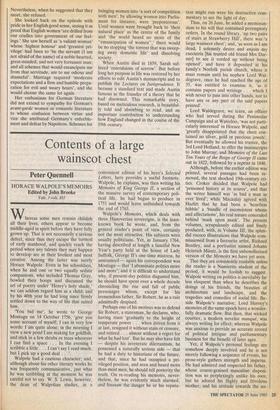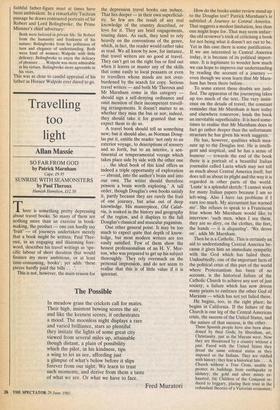Contents of a large wainscot chest
Peter Quennell
HORACE WALPOLE'S MEMOIRS Edited by John Brooke Yale, 3 vols, f65 Whereas some men remain childish all their lives, others appear to become middle-aged in spirit before they have fully grown up. That is not necessarily a serious defect, since thus they escape the turmoil of early manhood, and quickly reach the period when any talents they may happen to develop are at their liveliest and most creative. Among the latter was surely Horace Walpole. Even in his schooldays, when he and one or two equally sedate companions, who included Thomas Gray, bowled their hoops and discussed the art of poetry under 'Henry's holy shade,' we can seldom regard him as a child; and by his 40th year he had long since firmly settled down to the way of life that suited him.
'You bid me', he wrote to George Montagu on 14 October 1756, 'give you some account of myself; I can in very few words: I am quite alone; in the morning I view a new pond I am making for goldfish, and stick in a few shrubs or trees wherever I can find a space . . . In the evening I scribble a little . . . I can't say I read much, but I pick up a good deal . . .'.
Walpole had a cautious character; and, although about his other literary works he was frequently communicative, just what he was scribbling at the moment he was careful not to say. W. S. Lewis, however, the dean of Walpolian studies, in a convenient edition of his hero's Selected Letters, here provides a useful footnote. Walpole, he explains, was then writing his Memoirs of King George II, a section of the massive survey of contemporary poli- tical life, he had begun to produce in 1751 and would leave unfinished towards the end of 1763.
Walpole's Memoirs, which deals with three Hanoverian sovereigns, is the least- known book he wrote, and, from the general reader's point of view, certainly not the most attractive. His subjects were usually politicians. Yet, in January 1764, having described at length a fanciful New Year's party held at the house of Lady Suffolk, George II's one-time mistress, he announced — again his correspondent was Montagu — that 'I abominate politics more and more'; and it is difficult to understand why, if present-day politics disgusted him, he should have spent over a whole decade chronicling the rise and fall of public personages whom, except for his tremendous father, Sir Robert, he as a rule admittedly despised.
Perhaps one of his motives was to defend Sir Robert, a statesman, he declares, who, having risen 'gradually to the height of temperate power. . . when driven from it at last, resigned it without stain or censure, and retired. . . almost without a regret for what he had lost'. But he may also have felt — despite his inveterate dilettantism, he possessed a naturally serious side — that he had a duty to historians of the future, and that, since he had occupied a pri- vileged position, and seen and heard more than most men, he should tell posterity the truth. On re-reading his memoirs, never- theless, he was evidently much alarmed, and foresaw the danger he or his reputa- tion might run were his destructive com- mentary to see the light of day.
Thus, on 26 June, he added a memoran- dum to his will that contained peremptory orders. In the round library, 'up two pairs of stairs at Strawberry Hill', there was 'a large wainscot chest'; and, 'as soon as I am dead, I solemnly desire and enjoin my executrix [his trusted old friend Mrs Dar- ner] to see it corded up without being opened', and have it deposited at his family's Norfolk parish church, where it must remain until his nephew Lord Wal- degrave, once he had reached the age of 35, was entitled to examine it, 'as it contains papers and writings . . . which I wish never to pass into other hands, nor to have any or any part of the said papers printed'.
Lord Waldegrave, we learn, an officer who had served during the Peninsular Campaign and at Waterloo, 'was not parti- cularly interested' in Horace Walpole, and 'greatly disappointed that the chest con- tained no silver, gold or precious jewels'.
But eventually he allowed his trustee, the 3rd Lord Holland, to offer the manuscripts to John Murray; and Memoirs of the Last
Ten Years of the Reign of George II came out in 1822, followed by a reprint in 1846. Although, before the earlier edition was printed, several passages had been re- moved, the text shocked 19th-century cri- tics. Croker decided that Walpole had 'poisoned history at its source', and that the writer himself was 'as bad a man as ever lived'; while Macaulay agreed with Hazlitt that he had been a 'heartless fribble' a 'bundle of inconsistent whims and affectations', his real nature concealed behind 'mask upon mask'. The present volumes, scrupulously edited and finely produced, with, in Volume III, the splen- did rococo illustrations that Walpole com- missioned from a favourite artist, Richard Bentley, and a portraitist named Johann Heinrich Mintz, is the first unbowdlerised version of the Memoirs we have yet seen.
That they are consistently readable unless the reader is a Namierite student of the period, it would be foolish to suggest.
Walpole writing on politics is inevitably far less eloquent than when he describes the doings of his friends, the beauties of architecture and landscape, and the tragedies and comedies of social life. Be- side Walpole's narrative, Lord Hervey's memoirs of the same epoch have a wonder- fully dramatic flow. But then, that wicked courtier, a modern novelist manqué, was always writing for effect; whereas Walpole was anxious to provide an accurate record of political intrigue and parliamentary business for the benefit of later ages.
Yet, if Walpole's personal feelings are somehow deeply involved and he is not merely following a sequence of events, his prose-style gathers strength and impetus. He had admired and respected his father, whose coarse-grained masculine disposi- tion was so perplexingly unlike his own; but he adored his flighty and frivolous mother; and his attitude towards the un- faithful father-figure must at times have been ambivalent. In a remarkably Tacitean passage he draws contrasted portraits of Sir Robert and Lord Bolingbroke, the Prime Minister's chief adversary:
Both were beloved in private life: Sir Robert from the humanity and frankness of his nature; Bolingbroke from his politeness of turn and elegance of understanding. Both were fond of women; Walpole with little delicacy; Bolingbroke to enjoy the delicacy of pleasure. . . Walpole was more admirable in his virtues. Bolingbroke more agreeable in his vices.
This was as close to candid appraisal of his father as Horace Walpole ever dared to go.



























































 Previous page
Previous page